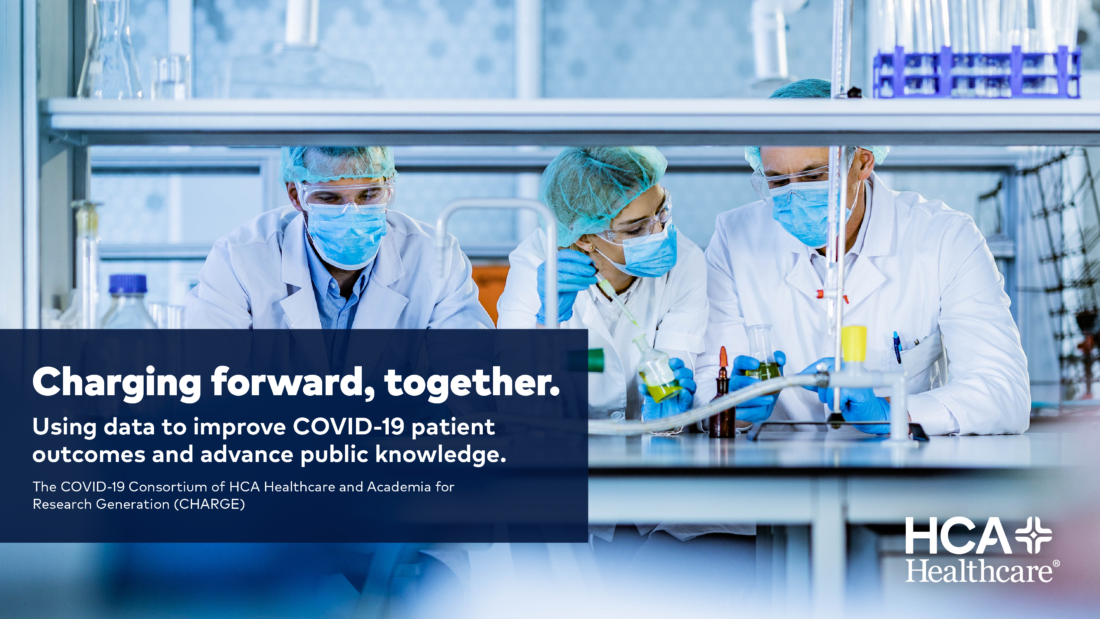JAMA Network
Jonathan Perlin, MD, PhD1; Kenneth Sands, MD, MPH1; David Meyers, MD2
May 6, 2022
aretove
What should a health system do when in possession of the largest and most coherent data set that could help accelerate the understanding of COVID-19 and its treatment?
For HCA Healthcare, a large health care organization comprised of 185 hospitals and more than 2000 sites of care in 20 US states and the UK, the answer to this question was a matter of social responsibility:
harness the potential of this asset through data sharing and research collaborations with public-sector and academic institutions.
What should a health system do when in possession of the largest and most coherent data set that could help accelerate the understanding of COVID-19 and its treatment?
harness the potential of this asset through data sharing and research collaborations with public-sector and academic institutions.
Although straightforward in concept, this goal was technically and ethically complex.
By building on a legacy of multi-institution research partnerships and in conjunction with the Agency for Healthcare Research and Quality (AHRQ), a COVID-19 research consortium known as CHARGE (Consortium of HCA Healthcare and Academia for Research Generation) was rapidly initiated.1
Structure of the publication
- A Framework for Change
- Responding to COVID-19
- Guiding Principles and Challenges in Consortium Building
- Conclusions
A Framework for Change
Since 2006, the learning health system model has provided guiding principles for incorporating evidence into care delivery and harvesting knowledge generated from clinical care.2,3
At HCA Healthcare, this model was pursued through more than a decade of investment in the technical infrastructure for data capture, standardization, storage, and analytics, including data interoperability among disparate electronic health records and other production systems.
These efforts have facilitated the use of data from an average of 32 million patient encounters per year for real-time decision support, operational and quality improvement, and research.
At HCA Healthcare, this model was pursued through more than a decade of investment in the technical infrastructure
This commitment to a learning health system also fostered partnerships for health services research at a scale and speed not previously available.
The first of these projects, the Randomized Evaluation of Decolonization vs Universal Clearance to Eliminate methicillin-resistant Staphylococcus aureus (REDUCE MRSA) trial, involved nearly 74 000 patients participating in a cluster-randomized comparative effectiveness trial in 44 hospitals.
In just 18 months, this study found that universal decolonization of patients in the intensive care unit was associated with a 44% reduction in bloodstream infections.4
Embedding the research protocol within hospitals’ routine care delivery processes reduced the overall trial cost and increased staff buy-in during implementation.5
This model has persisted beyond the REDUCE MRSA trial, supporting several other high-impact studies and collaborative projects.6–8
Responding to COVID-19
Within this framework, the COVID-19 pandemic provided both an opportunity to further test the model and a challenge for learning from the clinical data.
As the pandemic progressed and the patient care burden increased, the amount of data — and questions about treatment — were too vast for a single institution to manage.
HCA Healthcare created a curated registry of data during the care of 121 000 inpatients with COVID-19 in 2020 and engaged external partners to collaborate in research, starting with AHRQ.
With a legacy of health services research, AHRQ helped guide the development of CHARGE as a long-term collaboration to facilitate external researchers using registry data to expand evidence regarding the best management of COVID-19.
As the pandemic progressed and the patient care burden increased, the amount of data … were too vast for a single institution to manage.
HCA Healthcare created a curated registry of data … and engaged external partners to collaborate in research, starting with AHRQ.
The public-private-academic collaboration that became CHARGE was a natural outgrowth of the previous framework for research partnerships. CHARGE has 4 main objectives:
- accelerate understanding of COVID-19 and its treatment;
- introduce novel technology for collaborative research;
- build a flexible new research partnership; and
- create a platform to accelerate quality and safety.

Guiding Principles and Challenges in Consortium Building
Research partners were selected to maximize connections to investigators with varied backgrounds and expertise.
AHRQ brought knowledge of health care systems and barriers to improvement as well as connection to its Hospital Medicine Reengineering Network.
Additional academic collaborators included researchers at institutions that had previously partnered with HCA Healthcare and were familiar with the opportunities and challenges of using near real-time clinical data.
Governance was provided by a consortium steering committee with representation from HCA Healthcare, AHRQ, and each of the 10 partner academic institutions.
A formal memorandum signed between each partner and HCA Healthcare established protocols for governance and agreements regarding study approval, data use, and authorship.
While HCA Healthcare retained full control of its registry data sets and their use, consortium members were provided academic freedom to conduct approved studies.
While HCA Healthcare retained full control of its registry data sets and their use, consortium members were provided academic freedom to conduct approved studies.
Following a feasibility review, the steering committee reviewed research proposals and provided guidance to refine research questions.
Proposals received institutional review board (IRB) review prior to sharing of study-specific limited data sets.
Principal investigators directed the relevant analyses in collaboration with other consortium partners and workgroups were created around each proposal to share research methods.
Operational support for all workgroups, including database management, subject matter expertise, legal and privacy consultation, and other support, was provided by HCA Healthcare.
Through this process, a portfolio of 10 research projects has been approved through March 2022 addressing topics such as therapeutic efficacy, health equity, risk stratification, operation efficiency, and predictive models for COVID-19 outcomes.
The urgency of the COVID-19 pandemic created an ethical imperative to accelerate evidence generation and overcome barriers to data sharing.
The importance of embedding researchers and research methods into clinical delivery systems had been previously established.
Research questions had to be
- useful and relevant to operations,
- easily interpretable,
- provide actionable answers for caregivers, and
- be readily implementable so that patients would receive the best evidence-based care possible.
Furthermore, data privacy and protection were of utmost concern.
As data at rest are more secure, a partner was engaged to develop a model for differential privacy through the injection of statistical noise to replicated data sets, enabling researchers to work with a synthetic representation of original data to develop and train their statistical models.
Given the novelty of complex patient-level research on synthetic data, additional data use agreements allowed the sharing of limited data sets for research purposes.
Due to technical challenges in the synthetic data process, initial proposals used these limited data sets.
Additional investment was required to curate and support the registry for research purposes.
These costs were underwritten by HCA Healthcare to establish CHARGE, including effort by key leaders and staff.
No formal funding was pursued as a consortium.
Research partners agreed to cover the costs of their study teams and seek extramural funding if needed.
As part of the governance structure, a common IRB framework was established through HCA Healthcare.
Guardrails were defined for research activities, including commitment requirements for data security, privacy, and ethical conduct.
However, some hesitancy from IRBs at a few partner institutions regarding the common framework delayed approvals for their investigators.
In retrospect, this hesitancy appeared to be related to the consortium’s novel operating features and goals; this factor will be addressed with dedicated operational support for future partnerships.
Conclusions
As of March 2022, 10 projects were in various stages of implementation, including 1 publication,9 and other collaborative research projects are under way.
Most of these collaborations did not exist prior to CHARGE.
The creation of CHARGE facilitated the development of data solutions and research partnerships to use vast amounts of health care data collected during the care of a large influx of critically ill patients.
Harvesting real world evidence is the goal of a learning health system.
Although a large health system may use data assets for operational improvement, the notion of data as a more public utility is novel.
Although a large health system may use data assets for operational improvement, the notion of data as a more public utility is novel.
Harnessing clinical data requires investment in data infrastructure, data curation, analytic tools, and the governance necessary for the responsible use of the resource.
This data resource can also support agile research partnerships to address important clinical and societal challenges.
We believe CHARGE created a framework to support data sharing and research collaborations with public-sector and academic institutions that may provide a model for future work and an example of the learning health system in action.
References
See original publication
About the authors & affiliations
Jonathan Perlin, MD, PhD1;
Kenneth Sands, MD, MPH1;
David Meyers, MD2
1 HCA Healthcare, Nashville, Tennessee
2 Agency for Healthcare Research and Quality, Rockville, Maryland











